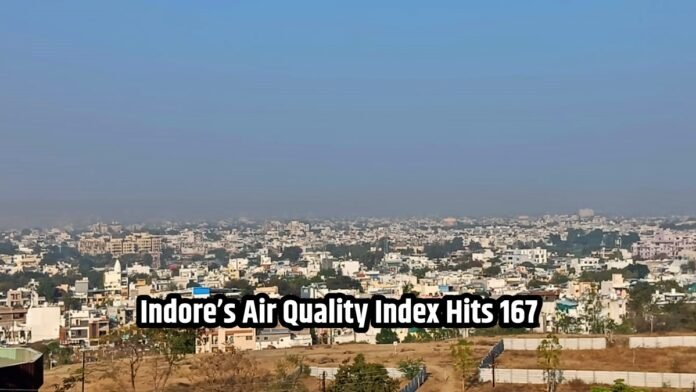
Key Points:
- Unhealthy AQI of 167: Indore’s air quality is deteriorating, crossing the “unhealthy” threshold.
- Major Pollutants: PM2.5 at 78 µg/m³ and PM10 at 207 µg/m³ dominate the pollution landscape.
- Contributors: Vehicle emissions, industrial activities, construction dust, and weather conditions are primary culprits.
- Health Warnings: Respiratory issues, asthma attacks, and cardiovascular problems are potential risks.
- Precautions: Residents advised to limit outdoor exposure, use air purifiers, and wear masks outdoors.
Indore: The Air Quality Index (AQI) in Indore has reached an alarming level of 167 on 21st january 2025, classified as “unhealthy,” especially for sensitive groups such as children, the elderly, and individuals with pre-existing health conditions. The spike in pollution is raising serious health concerns for the city’s residents.
Pollution Breakdown
The primary pollutants and their sources include:
- Particulate Matter (PM2.5 and PM10)
- PM2.5: 78 µg/m³
- PM10: 207 µg/m³
These fine particles originate from vehicle emissions, industrial activities, and dust from construction sites.
- Carbon Monoxide (CO)
- Concentration: 1412 ppb
Sources: Incomplete combustion from vehicles and industrial processes.
- Nitrogen Dioxide (NO2)
- Concentration: 26 ppb
Sources: Primarily from vehicle exhaust and industrial emissions.
- Sulfur Dioxide (SO2)
- Concentration: 8 ppb
Source: Fossil fuel combustion in power plants and factories.
- Weather Conditions
- Mist and low wind speeds (5 km/h) are trapping pollutants, worsening air stagnation.
Health Impact of Poor Air Quality
Short-Term Effects:
- Respiratory Issues: Coughing, wheezing, and throat irritation.
- Asthma Attacks: Increased frequency and severity.
- Chest Pain: Burning sensations and reduced lung capacity.
Long-Term Effects:
- Chronic Diseases: Long-term exposure could lead to COPD, bronchitis, and lung cancer.
- Heart Diseases: Elevated risk of heart attacks and strokes.
- Developmental Concerns: Children exposed to pollution may face reduced lung growth and cognitive impairments.
Who is Most Vulnerable?
- Children: Higher risk due to developing lungs.
- Elderly: Susceptible to respiratory and cardiovascular complications.
- People with Pre-existing Conditions: Higher risk of exacerbation of asthma, heart conditions, or chronic bronchitis.
Safety Measures and Recommendations
- Stay Indoors: Avoid outdoor activities, especially during peak pollution hours.
- Air Purifiers: Use purifiers indoors to maintain clean air.
- Masks: Wear N95 masks when stepping outside.
- Monitor AQI: Regularly check air quality updates to plan activities.
- Hydration and Diet: Drink plenty of water and consume antioxidant-rich foods to combat the effects of pollutants.
With Indore’s air quality posing significant health risks, awareness and timely precautions are crucial to safeguarding public health.
Advertisement




















































